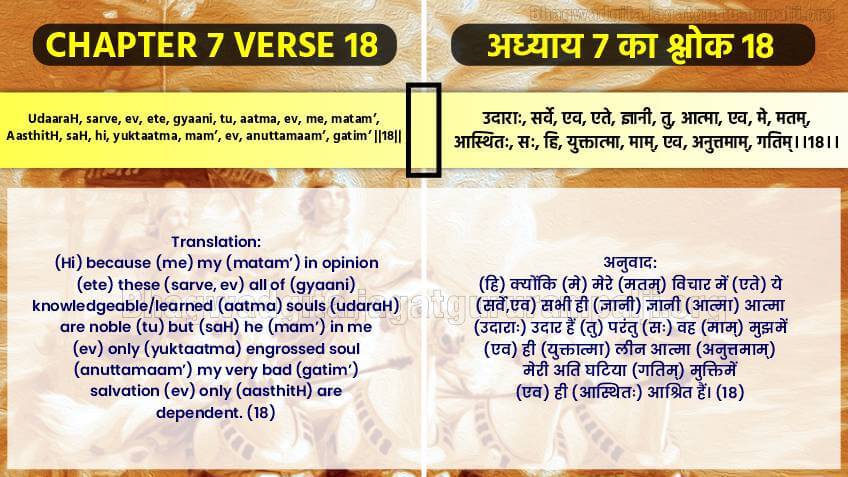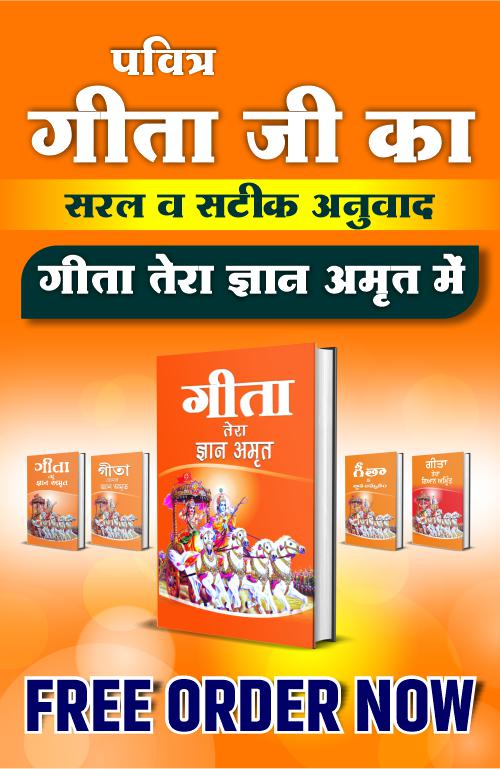
UdaaraH, sarve, ev, ete, gyaani, tu, aatma, ev, me, matam’,
AasthitH, saH, hi, yuktaatma, mam’, ev, anuttamaam’, gatim’ ||18||
Translation: (Hi) because (me) my (matam’) in opinion (ete) these (sarve, ev) all of (gyaani) knowledgeable/learned (aatma) souls (udaraH) are noble (tu) but (saH) he (mam’) in me (ev) only (yuktaatma) engrossed soul (anuttamaam’) my very bad (gatim’) salvation (ev) only (aasthitH) are dependent. (18)
Translation
Because in my opinion all these learned souls are noble, but that soul engrossed only in me is dependent only on my very bad salvation.
The meaning of Gita Adhyay 7 Shlok 16 to 18 is that even my i.e. Brahm’s bhakti is done by four types of devotees; 1. Aart: who perform rites only by Ved mantras for warding off crisis; 2. Artharthi: who performs rites only by Ved mantras to seek wealth; 3. Jigyasu: who with the desire of attaining knowledge, accumulates knowledge by studying the Vedas, and then becoming a speaker wastes away his life; 4. Gyani: a worshipper who read the Vedas and found that one gets a human life only to attain God and will only become successful by the bhakti of one Supreme God. Because of not finding a Tatvdarshi Saint, who is mentioned in Gita Adhyay 4 Shlok 34, considering Brahm only as the Supreme God, he kept doing Kaal (Brahm)-worship which is said to be very bad i.e. even Brahm-worship is inferior.
Question: - You have written incorrect meaning in the translation of Gita Adhyay 7 Shlok 18. You have written the meaning of “Anuttamaam’” as “Ashreshth” / “Bad / Inferior”; whereas in compound, the meaning of ‘Anuttam’ is ‘Ati Uttam’ / ‘very good’. Compared to whom there is no one better, regarding him/it, in compound the meaning of ‘Anuttam’ is ‘Ati Uttam’. The other translators of Gita have written the correct meaning. They have written the meaning of ‘anuttam’ as ‘ati uttam’ / ‘very good’.
Answer: - Accepting this statement of yours to be true, I am requesting you that the giver of the knowledge of Gita is telling about his worship in Gita Adhyay 7 Shlok 16 to 18. If in Gita Adhyay 7 Shlok 18 he is describing his worship as “Anuttam”, whose meaning according to your compound is this that there is no better salvation than the salvation of the giver of the knowledge of Gita.
The giver of the knowledge of Gita, in Gita Adhyay 18 Shlok 62 and Adhyay 15 Shlok 4, is himself telling to go in the refuge of some other God. By only His grace supreme peace and the eternal place, the ever-lasting place of salvation i.e. Satyalok will be attained. About himself also, has said that I am also in His refuge only. One should worship that Supreme/Complete God alone, and has stated that one should attain the supreme state (Satyalok) of that Supreme God. Having gone where, worshippers never return to this world i.e. their birth and death ends forever.
In Gita Adhyay 18 Shlok 46, 61-62, 64, 66; Adhyay 15 Shlok 4, 16-17; Adhyay 13 Shlok 12 to 17, 22 to 24, 27-28, 30-31, 34; Adhyay 5 Shlok 6 to 10, 13 to 21 and 24-25-26; Adhyay 6 Shlok 7, 19, 20, 25, 26-27; Adhyay 4 Shlok 31-32; Adhyay 8 Shlok 3, 8 to 10, 17 to 22; Adhyay 7 Shlok 19 to 29; Adhyay 14 Shlok 19 etc-etc Shloks has mentioned about some other God than himself. It has been proved from this that there is some other God superior i.e. better than the giver of the knowledge of Gita. Like, in Gita Adhyay 15 Shlok 17, the giver of the knowledge of Gita has stated that “Uttam PurushH tu anyaH”, which means that the Supreme God is indeed someone else. Therefore the salvation of i.e. salvation obtained from that Supreme God i.e. Superior most God will also be superior most. This is also proved from this that the salvation of that Supreme God i.e. Complete God is superior to the salvation of the giver of the knowledge of Gita. Therefore the salvation of the giver of the knowledge of Gita is not superior most. Superior most means compared to which there is nothing more superior; so this adjective has also been proved wrong for the salvation of the giver of the knowledge of Gita. Because if there is some other God superior to the giver of the knowledge of Gita, then His salvation is also superior to that of the giver of the knowledge of Gita. It has been proved from this that in Gita Adhyay 7 Shlok 18, the meaning of “anuttam” is justified to be “inferior/bad” i.e. is correct. You and the other translators of Gita have written incorrect meaning, who have said and written the meaning of “anuttam” as “very good/superior most”.
उदाराः, सर्वे, एव, एते, ज्ञानी, तु, आत्मा, एव, मे, मतम्,
आस्थितः, सः, हि, युक्तात्मा, माम्, एव, अनुत्तमाम्, गतिम्।।18।।
अनुवाद: (हि) क्योंकि (मे) मेरे (मतम्) विचार में (एते) ये (सर्वे,एव) सभी ही (ज्ञानी) ज्ञानी (आत्मा) आत्मा (उदाराः) उदार हैं (तु) परंतु (सः) वह (माम्) मुझमें (एव) ही (युक्तात्मा) लीन आत्मा (अनुत्तमाम्) मेरी अति घटिया (गतिम्) मुक्तिमें (एव) ही (आस्थितः) आश्रित हैं। (18)
केवल हिन्दी अनुवाद: क्योंकि मेरे विचार में ये सभी ही ज्ञानी आत्मा उदार हैं परंतु वह मुझमें ही लीन आत्मा मेरी अति घटिया मुक्तिमें ही आश्रित हैं। (18)
गीता अध्याय 7 श्लोक 16 से 18 का भावार्थ है कि मेरी अर्थात् ब्रह्म की भक्ति भी चार प्रकार के भक्त करते हैं 1. आत्र्त: जो संकट निवार्ण के लिए वेद मंत्रों से ही अनुष्ठान करते हैं 2. अर्थार्थी: जो धन लाभ के लिए वेद मंत्रों से ही अनुष्ठान आदि करता है 3. जिज्ञासु: जो ज्ञान प्राप्ति की इच्छा से वेदों का पठन-पाठन करके ज्ञान संग्रह कर लेता है फिर वक्ता बनकर जीवन व्यर्थ कर जाता है 4. ज्ञानी: जिस साधक ने वेदों को पढ़ा तथा जाना कि मनुष्य जीवन केवल प्रभु प्राप्ति के लिए ही मिला है तथा एक पूर्ण परमात्मा की भक्ति से ही पूर्ण होगा। तत्वदर्शी संत जो गीता अध्याय 4 श्लोक 34 मंे वर्णित है न मिलने से ब्रह्म को ही पूर्ण परमात्मा मान कर काल (ब्रह्म) साधना करते रहे जो अति अनुत्तम कही है अर्थात् ब्रह्म साधना भी अश्रेष्ठ है।
प्रश्न:- आपने गीता अध्याय 7 श्लोक 18 के अनुवाद में अर्थ का अनर्थ किया है ‘‘अनुत्तमाम्’’ का अर्थ अश्रेष्ठ किया है। जब कि समास में अनुत्तम का अर्थ अति उत्तम होता है जिस से उत्तम कोई और न हो उस के विषय में समास में अनुत्तम का अर्थ अति उत्तम होता है। अन्य गीता अनुवाद कत्र्ताओं ने सही अर्थ किया है अनुत्तम का अर्थ अति उत्तम किया है।
उत्तर:- मैं आप की इस बात को सत्य मानकर आप से प्रार्थना करता हूँ कि ‘‘गीता ज्ञान दाता अपनी साधना के विषय में गीता अध्याय 7 श्लोक 16 से 18 में बता रहे हैं। यदि गीता अध्याय 7 श्लोक 18 में अपनी साधना व गति को अनुत्तम कह रहे हैं। जिस का भावार्थ आप के समास के अनुसार यह हुआ कि गीता ज्ञान दाता की गति से उत्तम अन्य कोई गति नहीं अर्थात् मोक्ष लाभ नहीं।
गीता ज्ञान दाता स्वयं गीता अध्याय 18 श्लोक 62 व अध्याय 15 श्लोक 4 में किसी अन्य परमेश्वर की शरण में जाने को कह रहे हैं। उसी की कृपा से परम शान्ति व शाश्वत स्थान सदा ृ रहने वाला मोक्ष स्थल अर्थात् सत्यलोक प्राप्त होगा। अपने विषय में भी कहा है कि मैं भी उसी की शरण हूँ। उसी पूर्ण परमात्मा की भक्ति करनी चाहिए तथा कहा है कि उस परमेश्वर के परमपद (सत्यलोक) को प्राप्त करना चाहिए जहाँ जाने के पश्चात् साधक लौटकर इस संसार में कभी नहीं आते अर्थात् उनका जन्म मृत्यु सदा के लिए समाप्त हो जाता है।
गीता ज्ञान दाता ने अपने से अन्य परमात्मा के विषय में गीता अध्याय 18 श्लोक 46, 61- 62, 64, 66 अध्याय 15 श्लोक 4,16-17, अध्याय 13 श्लोक 12 से 17, 22 से 24, 27-28, 30-31, 34 अध्याय 5 श्लोक 6-10,13 से 21 तथा 24-25-26 अध्याय 6 श्लोक 7,19, 20, 25, 26-27 अध्याय 4 श्लोक 31-32, अध्याय 8 श्लोक 3, 8 से 10, 17 से 22, अध्याय 7 श्लोक 19 से 29, अध्याय 14 श्लोक 19 आदि.2 श्लोकों में कहा है। इससे सिद्ध हुआ कि गीता ज्ञान दाता से श्रेष्ठ अर्थात् उत्तम परमात्मा तो अन्य है जैसे गीता अध्याय 15 श्लोक 17 में गीता ज्ञान दाता ने कहा है कि उत्तम पुरूषः तु अन्यः जिसका अर्थ है उत्तम परमात्मा तो अन्य ही है। इसलिए उस उत्तम पुरूष अर्थात् सर्वश्रेष्ठ परमात्मा की गति अर्थात् उस से मिलने वाला मोक्ष भी अति उत्तम हुआ। इस से यह भी सिद्ध हुआ कि उस परमेश्वर अर्थात् पूर्ण परमात्मा की गति गीता ज्ञान दाता वाली गति से उत्तम हुई। इसलिए गीता ज्ञान दाता वाली गति सर्व श्रेष्ठ नहीं है। अर्थात् जिस से श्रेष्ठ कोई न हो। यह विशेषण भी गलत सिद्ध हुआ। क्योंकि जब गीता ज्ञान दाता से श्रेष्ठ कोई और परमेश्वर है तो उस की गति भी गीता ज्ञान दाता से श्रेष्ठ है। इससे सिद्ध हुआ कि गीता अध्याय 7 श्लोक 18 में अनुत्तम का अर्थ अश्रेष्ठ ही न्याय संगत है अर्थात् उचित है। आप तथा अन्य गीता अनुवाद कत्र्ताओं ने अर्थ का अनर्थ किया है। जो अनुत्तम का अर्थ अति उत्तम कहा तथा किया है।
